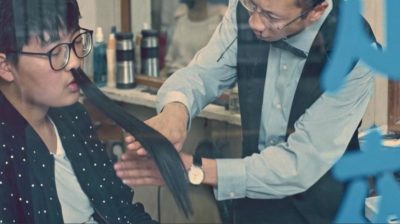
BEIJING (February 25, 2016) — Air pollution in China is unavoidable. Last year, 366 out of 366 cities surveyed failed to meet World Health Organization air quality standards, including Beijing. So perhaps it’s unsurprising that a recent WildAid report found that over 90% of Chinese are concerned about air pollution.
The question is: How can they help? “Hairy Nose,” a new public service announcement (PSA) from WildAid’s GOblue program, clears up how to clear the sky. In China, the new PSA is now being featured on a number of popular social media sites, a half-dozen national TV networks, and on outdoor screens, subway and taxi screens in major Chinese cities.
The first major PSA from GOblue, “Hairy Nose” is an eye-catching and thought-provoking concept that projects the issue of air pollution into the distant future. In this world, nose hair has evolved to filter pollution and has led to activities, fashion and culture centered on the now prominent facial features. In the face of this, one man refuses to accept the pollution and shaves his nose hair in defiance. The message for current urban residents is clear: Change air pollution before it changes you.
The GOblue program empowers people in China to make smart, low-carbon transportation choices in order to improve air quality and reduce greenhouse gas (GHG) emissions.
Air pollution has already changed China in numerous ways:
· Each year, at least 500,000 premature deaths can be attributed to air pollution. Other estimates are higher, including one from Berkeley Earth in California that puts the number at 1.6 million, and another from the Max Planck Institute in Germany that estimates 1.4 million.
· In northern cities, where air quality is on average much worse, life expectancy is 5.5 years lower than in southern cities.
· Over the past 30 years, deaths from lung cancer have risen 465%.
“Air pollution is the number one environmental and health concern in urban China, but most people are waiting for the government to enact change or improve the situation,” said May Mei, WildAid’s Chief China Representative. “It’s important that individuals know they have a role to play too.”
“Hairy Nose” ends with a message of encouragement for low-carbon transportation, such as bicycling. This is one major way in which Chinese can reduce air pollution. In 2015, the Ministry of Environmental Protection analyzed the chief sources of air pollution in nine major cities across the country and found that vehicles were the largest contributor to air pollution in at least five: Beijing, Shanghai, Hangzhou, Guangzhou and Shenzhen.
A 2015 WildAid survey showed that 88% of people in Tier-1 cities believed vehicle exhaust was the main source of haze. Despite 58% of survey respondents believing that the government and individuals are equally important in affecting change, the top ways respondents believe air quality can be improved are all government-led actions. “Hairy Nose” reminds citizens that they can make a difference, too — especially the nearly three-quarters of car users that report willingness to reduce driving time to improve air quality.
WildAid has leveraged its extensive pro bono media network in Asia, which in 2014 was worth nearly $200 million in donated airtime from media partners, to bring this message to millions of people each week. GOblue uses strategies from previous WildAid campaigns that have shown measurable results in reducing consumer demand for wildlife products such as ivory and shark fin.
WildAid has worked on mitigating climate change in China since 2011, when it launched the 5 To Do Today program. Through TV and billboard PSAs, documentaries and events, 5 To Do Today raised awareness and advocated behavior change related to GHG emissions from individual behaviors. GOblue, launched in 2015, uses similar techniques to reduce GHG and air pollution from transportation in urban China.
The video is inspired by the original hairy nose campaign produced for Clean Air Asia by advertising agency BBDO Guerrero. It was launched at BAQ conference in Hong Kong SAR in 2012. Clean Air Asia was very happy to share the idea with WildAid. And hopes that the continued use of the message will bring home the importance of keeping clean air on the agenda everywhere.
Stay in touch and get the latest WildAid updates.
SIGN UP
